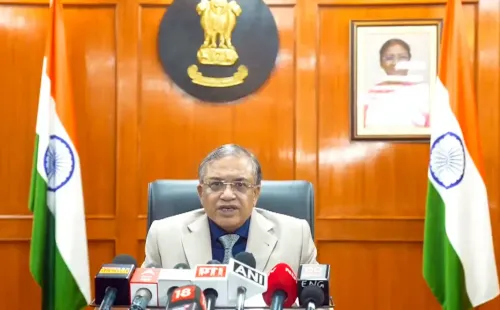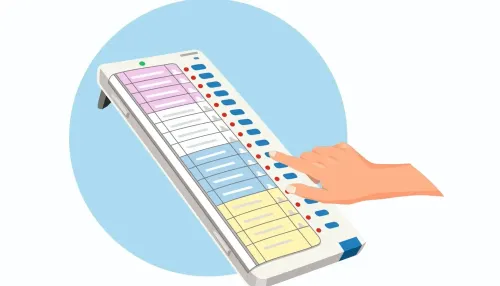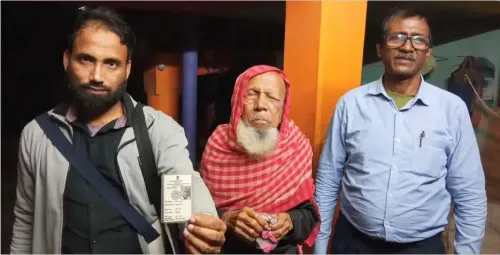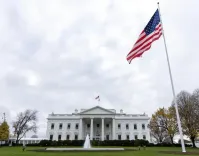Year in Review: Political Transformation in Andhra Pradesh
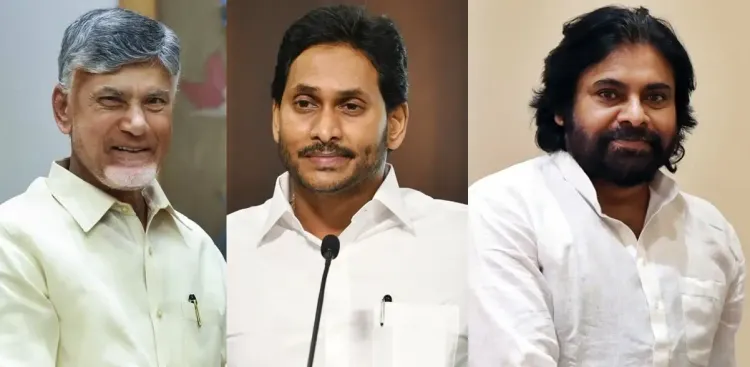
Amaravati, Dec 30 (NationPress) The year 2024 was characterized by a significant political transformation in Andhra Pradesh, highlighted by a decisive public mandate favoring the Telugu Desam Party (TDP)-led coalition.
During the initial months, a fierce contest unfolded as the YSR Congress Party endeavored to maintain its hold on power, but the latter half of the year witnessed a remarkable turnaround as the TDP, Jana Sena, and BJP surged to prominence.
Key moments of the year included unprecedented floods in Vijayawada, the recommencement of capital projects in Amaravati, disputes surrounding the revered Tirumala laddu, and initiatives to draw in investments.
The return of veteran leader Nara Chandrababu Naidu as Chief Minister and actor Pawan Kalyan stepping into the role of Deputy Chief Minister—after proving his political capabilities—were pivotal highlights of the state's political narrative this year.
The 74-year-old Naidu was visibly moved as he took the oath of office at a public gathering attended by Prime Minister Narendra Modi.
Engaged in a critical battle for his political future, the TDP leader's comeback was remarkable, capitalizing on the anti-incumbency sentiment and leading the three-party alliance to a significant victory against the YSRCP.
Throughout his 45-year political journey, Naidu seldom displayed emotion; however, this moment was transformative for him, especially after enduring humiliation in the Assembly and facing jail time on corruption allegations.
His profound disappointment following the November 2021 Assembly incident led him to publicly break down, vowing to return only upon winning the election and reclaiming the Chief Minister's office.
His most daunting challenge arose in September 2023 when he was apprehended over alleged irregularities linked to the Andhra Pradesh Skill Development Corporation from his previous administration (2014-19).
After spending 52 days in Rajahmundry Jail, he was released on bail on October 31.
During his incarceration, Pawan Kalyan announced his party's alliance with the TDP to confront the YSRCP.
As elections approached, the BJP joined forces with them. Jagan Mohan Reddy faced internal challenges as his sister, Y.S. Sharmila, became the head of the Congress party's state unit.
Sharmila and her cousin, Y.S. Sunitha Reddy, collaborated to exacerbate Jagan's difficulties, accusing him of protecting the murderer of his uncle and former minister, Y.S. Vivekananda Reddy, five years prior.
Although Sharmila struggled to revitalize Congress's political fortunes, the NDA effectively thwarted YSRCP's hopes of replicating its 2019 success in the Assembly.
The YSRCP's representation in the Assembly dwindled to just 11 seats, and it managed to retain only four Lok Sabha seats.
Conversely, the TDP secured a staggering 135 Assembly seats, the Jana Sena claimed all 21 Assembly seats it contested, while the BJP captured eight seats.
By winning 16 Lok Sabha seats, the TDP emerged as a significant player at the national level, supporting the BJP, which was unable to achieve a majority on its own.
Recognizing his need for assistance from the Center to restore the state’s finances and fulfill his electoral promises, including executing the ambitious Amaravati project and finalizing the long-overdue Polavaram project, Naidu opted to align with the BJP.
Naidu appears to be gaining favorable outcomes, as the Union Budget 2024-25, presented in July, addressed most of his requests. The Center has pledged to secure Rs. 15,000 crore through multilateral development agencies this financial year.
Naidu reinstated the capital projects that had been stalled since 2019 due to the YSRCP government's three capitals policy.
Since taking office, Naidu has approved infrastructure projects worth Rs. 47,972 crore in the capital region.
He has committed to completing these projects within three years.
Criticizing the YSRCP for neglecting the Polavaram project, which is predicted to be the state's lifeline, Naidu has begun prioritizing this mega irrigation initiative.
The coalition government has set an ambitious target to finish Polavaram by October 2026.
As promised during the elections, Naidu approved five initiatives upon taking office, including increasing social security pensions, conducting a large-scale District Selection Committee for teacher recruitment, repealing the Land Titling Act, reviving Anna Canteens, and initiating the country's first skill census.
On November 1, Naidu unveiled a scheme to provide three complimentary cooking gas cylinders to families living Below Poverty Line, fulfilling one of the commitments made in the 'Super Six' announced during the elections.
Despite criticism from the Opposition regarding delays in implementing 'Super Six,' the government recently formed a committee of ministers to develop a scheme for free bus travel for women.
Emphasizing his pro-business and tech-savvy reputation, Naidu has aggressively sought to attract investments to the state by offering incentives across various industries.
This month, Naidu claimed the state drew in Rs. 4 lakh crore in investments, potentially generating over four lakh jobs.
In detailing the accomplishments of his administration over the past six months, he stated that pensions were being distributed to more than 64 lakh beneficiaries at an annual cost of Rs. 33,000 crore, while 40 lakh cooking gas cylinders have been provided to underprivileged families under the Deepam-2 scheme.
Amaravati was the venue for the national drone summit, where the government introduced its drone policy, aiming to establish at least 100 drone manufacturing units and attract Rs. 1,000 crore in investments in this sector over the next five years.
This policy aspires to position Andhra Pradesh as a global hub for drone technology.
In October, the government announced six policies aimed at transforming the state into an industrial powerhouse by drawing investments across various sectors.
These policies were outlined for industrial advancement, MSME and entrepreneur development, food processing, electronics, private parks, and integrated clean energy.
This initiative was touted as a significant move toward fulfilling the promise of generating 20 lakh jobs within five years.
The industrial policy aims to attract Rs. 30 lakh crore in the manufacturing sector over the next five years.
It seeks to operationalize investments totaling Rs. 5 lakh crore during the policy implementation period.
The policy has set a target to draw Foreign Direct Investment of Rs. 83,000 crore and generate five lakh jobs in the manufacturing sector.
Additionally, the government plans to develop over 175 sector and cluster-focused industrial parks, aiming to double exports to Rs. 33,200 crore.
The MSME & Entrepreneur Development Policy seeks to attract Rs. 50,000 crore in the manufacturing sector.
The goal is to establish 22 lakh units in both manufacturing and services, aiming to create 5 lakh jobs within the manufacturing domain.
The NPTC Green Energy Limited (NGEL) has partnered with the New and Renewable Energy Development Corporation of Andhra Pradesh (NREDCAP) to develop renewable energy projects valued at Rs. 2 lakh crore in the state.
This partnership is anticipated to create jobs for 1,06,250 individuals and yield financial benefits of Rs. 20,620 crore over a period of 25 years.
In September, the new administration faced its most significant challenge when catastrophic rains inundated Vijayawada and neighboring areas.
The breach of the Budameru Rivulet resulted in the most devastating floods in the city in half a century.
The deluge claimed 46 lives and impacted more than 10 lakh individuals.
Leading relief operations, Naidu spent 10 days in the hardest-hit regions of Vijayawada.
The controversy surrounding the adulteration of the sacred Tirumala laddu also stirred significant unrest in the state. Naidu's explosive claim that ghee mixed with animal fat was used for the sacred offerings at the Tirumala temple during the YSR Congress's tenure ignited a fierce debate.
This sparked a bitter exchange between the ruling coalition and the YSRCP, as Jagan Mohan Reddy retaliated, accusing Naidu of false claims and undermining the sentiments of devotees.
Naidu had to cancel his planned visit to the Tirumala temple after leaders from the TDP, Jana Sena, and BJP threatened to disrupt it, insisting that Jagan sign an undertaking prior to entering the temple, in accordance with its rules for non-Hindus.
The Supreme Court remarked that Chandrababu Naidu should have 'kept the gods away from politics' before making public comments based on uncertain facts about the laddu's preparation during the previous administration.
This controversy also saw Deputy Chief Minister Pawan Kalyan positioning himself as a defender of Sanatana Dharma through his assertive approach and an 11-day 'Praschit Deeksha', concluding with a visit to the Tirumala temple.


